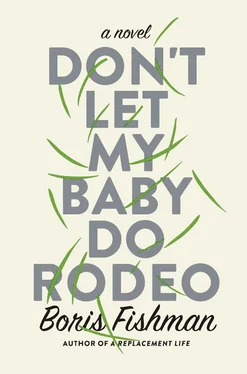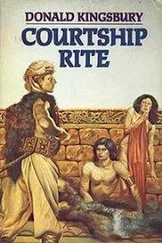“It’s Max,” she said.
“Not on the bus,” the driver repeated.
“But he went to school,” she opened her hands. She took in the driver’s gray T-shirt, swollen by the half globe of a gut, the blue sweatpants and brown sandals.
“Call the school?” he said. “But I’ve got to move now.” He checked the mirror for traffic.
Maya’s chest emptied out and she leaped onto the first stair of the bus. The driver looked on with astonishment.
“Children!” she yelled at the bus. The small heads poking out of the green rows gave her attention, even the ones in the back. “My son, Max. He takes this bus every day.”
They stared at her silently.
“Ma’am,” the driver said.
She swiveled to face him. “You might put on something more decent to set an example for children.”
His head retreated slightly, and a look of sleepy alarm came over his face.
She turned back to the rows. “Does anyone on the bus know who my son is?” They gazed at her stubbornly. They were not going to give anything up and they felt pity for her.
“You know Max,” the driver called out from behind her. She felt gratitude — he knew her son’s name. Then she remembered that she had just used it. “This is his mom.”
A hand shot up from a row midway down the aisle.
“You don’t have to raise your hand,” the driver said.
“Max took another bus,” the voice came. It was a girl’s voice. Maya surged down the aisle.
“What other bus?” she demanded. The girl — unattractive, a pug nose, Maya disliked her instantly, as if she were responsible for Max’s disappearance — shrugged.
“Was it a school bus?” the driver said. “Yellow.”
“No,” the girl said.
“Town bus? With purple stripes.”
The girl nodded.
“I don’t suppose you saw the number,” the driver said.
“It stops by the flagpole.”
“That’s the 748,” he said. Maya turned toward the driver. “That one goes north,” he said. “Toward the state line.”
“What state!” she exclaimed.
“New York State,” he said. His face folded, concern rising in it like color. Until a moment before, Maya had wanted to see it, and now she did not. “I’ll radio the school.”
Maya raked her temples. She heard the rumbling of the vehicle and the silence of the children. The back of the school bus was sticking out into Brandenburg Turnpike, cars backing up as they funneled into a single line to avoid it. The driver lifted a wired receiver, which crackled like a radio between stations, and murmured into it. Some of his belly rested on the lower part of the steering wheel.
“I can’t get them,” he said, exhaling contritely. “They’re busy with buses. But I’ll get ’em. He’ll turn up.”
Things had improved between them, between her and the driver, and Maya tried to take this to mean that good things were possible and her son would return. She stared out of the open doors down at the drive, its familiar plunge suddenly malevolent and abundant with risk. Without turning back to the driver, she rushed the steps down to the ground and ran toward home, the pavement going off in her knees. Behind her she heard sounds belonging to other people in another world: the bus doors sliding shut, the brake coming off, the bus shuddering off to the next residential development, where children would be disgorged into the hands of their mothers, an unremarkable ritual made remarkable only by its failure to take place.
+
Maya was unvigilant about her cell phone. She would be serving dinner to Alex and his parents, who almost always ate alongside their son and his wife, and hear that each of them had left multiple messages earlier. This information was relayed to her with exasperation covered with feigned amusement. Now, predictably, her handbag, emptied out on the dining table, gave up nothing. She ran for the landline. At Max’s elementary school, she demanded the principal’s office. The man himself came on the line once word traveled why she was calling. Maya was too troubled to feel nervous about speaking to him. He listened to Maya’s news with a strange disappointment, as if she and not he had failed to keep an eye on her son. “I’ll stay late and make inquiries,” he said flatly. She admonished him that she was about to call the police, but it failed to have the intended effect: “Good idea,” he said noncommittally. She wanted more from him; he had lost her son. How could a child wander off school grounds and climb aboard a regional bus line? But she heard herself only thank him.
She walked the kitchen, trying to think of whom else she could try before Alex and his parents. There was no one. She called the police and was reassured by the temperate way with which her information was received by the dispatcher. Temperate meant that such things ended positively all the time — it had to mean that. Finally, she hit the buttons for Rubin Trading. The line strafed and buzzed. When the secretary’s voice came on, Maya burst into tears.
Alex and his father drove home in a mourner’s silence. Alex’s mother, who was taking her afternoon swim, was summoned by loudspeaker from the pool. Wary of all singling out, Raisa Rubin waited some time in the slow lane before making sure she had to come out. She did just in time for her husband and son to pick her up from the YMCA, and the three of them set off to receive Maya’s terrible news. When the bell rang, Maya ran for it, but on the other side of the door she discovered not her son but a mournful trio of Rubins, gazing at her as if her discovery of their child’s disappearance meant that she had lost him as well.
+
The elder Rubins lived right in Sylvan Gate, though enough properties away to be out of view in deference to American ideas about privacy. A forty-three-year-old son, and they weren’t seventy yet, Eugene still practically full-time at his food-importing business, all of which allowed the senior Rubins to feel a sense of youth and modernity. Of necessity, also: Where would Maya and Alex be without their aid? They had encouraged Maya to move from mammography to pharmacy — pharmacists earned in the six figures, with another half on the side if she wanted — but Maya was not proactive like them. Alex had tried investments, but if he had earned for himself a fraction as much as he earned for others, it didn’t show, and his father had persuaded him to become the second-in-command at Rubin Trading.
“Someone’s laid a hex on us,” Raisa said grimly. The four Rubins, two by birth and the others by choice, were leaned over the kitchen table in a tight, anxious circle.
“When I was a boy, I ran away, too,” Eugene said. “My father laid the strap to me. I didn’t run away again.”
“So why didn’t you do it to me if it was so effective?” Alex said.
Eugene looked up. “You didn’t need it.”
“I don’t understand why you called the police,” Raisa said to Maya. “People will find out and think he’s some kind of runaway!” The other Rubins looked at Raisa in such a way that she did not try this line of argument a second time.
Eugene shook his head. “I always said this was a bad idea. I’ve always known something would go wrong. It was only a matter of time. I kept quiet only because I didn’t want to upset you. But I was waiting for this day.”
“Please don’t go back to that,” Alex said. “He’s a boy. Boys act up. It’s nothing.”
“You like to bury your head in the sand,” Eugene said. “Your mother set you up nicely for that.” He cast a disparaging look at his wife. “But problems don’t fix themselves. Customs is not going to wake up tomorrow and realize they made an error and expedite my honey. Philadelphia is not going to get why Bulgarian feta is just as good as Greek fucking feta unless I go down there, and I open the buyer’s mouth, and I put a square of Bulgarian feta in it—”
Читать дальше












